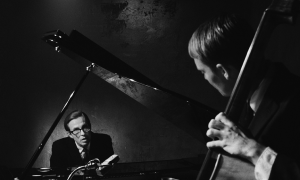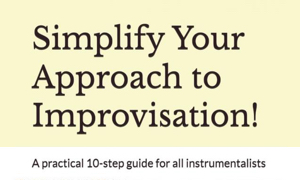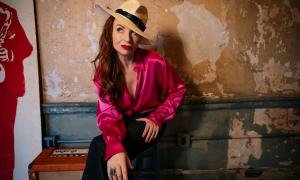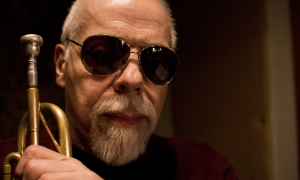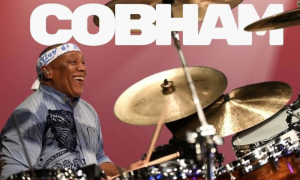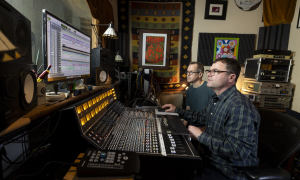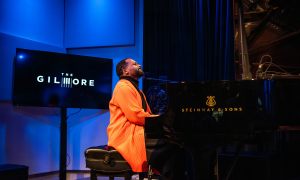She sings the traditional three-song set at storied fado houses in Lisbon, picking her songs right before stepping out on stage in front of the candlelit room, following the call of her heart at that moment. She improvises vocal lines on stage with Mick Jagger in front of packed stadiums.
She grew up hearing her mom sing the serpentine songs of traditional fado while doing the dishes. She got her start singing rock. Now she hangs with Prince, who was so moved by her music that he called her out of the blue one morning, in what she at first took for a prank.
She uses a spare trio of the traditional guitarra (the 12 metal-stringed Portuguese guitar), acoustic guitar, and bass to back her heartfelt voice. She is inspired by the big sounds of Nina Simone and Marvin Gaye to find new ways to explore her love affair with Portugal's answer to the blues.
This study in contrasts is the stunning Ana Moura, one of fado's most intriguing young voices. Long beloved and ever flexible, Portugal's bittersweet musical tradition is transformed by Moura's velvet contralto and spontaneous soul on Leve-me Aos Fados (Take Me To A Fado House) (World Village; April 13, 2010) and in concert this April, as Moura comes to New York, Boston, Los Angeles,and San Francisco, as part of a North American tour.
“Fado is about what's going on in our souls. What we singers pick in the moment is about what we are feeling, that's the feeling of the fado house," Moura explains, describing her approach to performances. “I do that in concert with one or two songs, pick them at the moment according to how I feel right then. I never know beforehand which fados I'm going to sing."
This spontaneity leaves ample room for innovation and unexpected twists. Though deeply traditional, fado has always been a vehicle for new perspectives and sounds. “We listen to other kinds of music, too, and when something new comes into the fado, it's normal," notes Moura. “Musicians bring new arrangements, new things to the traditional fado, but it's very subtle and organic."
As part of this process, ancient melodies become settings for new lyrics, and Ana puts new words-her own or those of well-known contemporary lyricists like Jorge Fernando-to old tunes, as fado musicians have for generations. Because “fado is all about feelings" as Moura puts it, these new perspectives reflect the modern state of relationships.
“There are lyrics I love from the older generation but I can't sing them because I wouldn't react to a situation like that," Moura smiles. “Back in those days, women were more submissive. Now we are not; we're independent. We have our jobs and freedom. In matters of the heart, we face our feelings in different ways and the ways we tell our story are different."
Moura's own story is one of outrageous fortune. Fado, after all, means “fate" in Portuguese. Though she had always been drawn to fados, it was not until her early twenties that a chance meeting with several musicians at a bar where friends urged her to sing a fado led her eventually to one of Lisbon's most famous fado houses. Her new found acquaintances invited her to a party, the owner of the fado house fell in love with her singing, and she found herself performing nightly.
“I was recording a pop and rock CD but I would sometimes sing a fado, with an electric guitar," Moura laughs. “Then I started to work at the fado house and fell in love with the atmosphere. You stand right next to the audience and sing from your soul in the same beautiful building where famous poets once wrote."
The young singer was quickly taken in by the older generation of musicians. There's a belief among fado musicians that fadistas are born, never made. There's a certain something that can't be articulated or taught; it can only be invoked, like the swing in jazz or that perfect sense of the blues.
Moura, from her accidental start as a fado singer, was tapped by the usually reticent and reluctant elder fadistas she sang for as a born artist. “The older musicians sometimes don't accept young people very well," says Moura. “Their circle can be very closed. I was very well accepted, though." She was so overwhelmed by this endorsement that she switched gears, dedicating herself to the music she had loved growing up. Even the producer of her rock album told her to record her fados instead.
Yet fate had more in store for Moura, including rubbing musical shoulders with some of the world's pop luminaries. When The Rolling Stones came to Portugal, they wanted to catch some real-deal fado. They came and listened to Moura, who nervously eyed Mick Jagger until she got swept up in her song. To return the favor, they invited her to join them for dinner and their concert.
Little did she know that the invitation included a spot on stage, a turn of events that took Moura completely by surprise. “Mick said, 'I sing four keys higher than you.' I had to improvise a new melody to the song. I was supposed to go have dinner and watch the concert, but not sing with them!" Moura exclaims. After running through the song twice, the show got started. “At first I was so nervous. I forgot what I had worked out during our rehearsal. But then I started singing, making things up on the spot," as the audience went wild.
Moura's voice and interpretation of fado not only wowed rock's elder statesmen; it brought pop icon Prince to Paris to hear her. “I got a phone call really early in the morning," Moura recalls with a smile. “It was Prince's bodyguard, but I thought it was a musician friend from New York. I was really shocked when he said he was going to put Prince on the phone." The musician had heard one of her albums and become fascinated with her music and voice.
Beyond all the celebrity and praise -- Moura has won prestigious awards, played at her native land's most important venues, and toured extensively since that fateful song at the bar -- Moura remains passionately devoted to the fados. “Fado is to be felt and each person has the freedom to feel and to use the song in their particular way," Moura muses. “Sometimes we try to describe too much. I want to leave everyone the freedom to feel fado for themselves."
Tour Dates
04/17/2010, Sat: Boston, MA: Berklee Performance Center, 136 Massachusetts Avenue; Tix: $28.00/22.00; Show: 8:00 PM; Ph: 800-237-5533
04/18/2010, Sun: New York, NY: Symphony Space, Peter Jay Sharp Theatre, 2537 Broadway at 95th Street; Tix: $32.00/27.00/18.00; Show: 7:00 PM; Ph: 212.864.5400
04/21/2010, Wed: Las Cruces, NM: New Mexico State University, 1780 East University Avenue; Tix: $15.00/10.00; Show: 8:00 PM; Ph: (575) 646.4413
04/22/2010, Thu: Los Angeles, CA: Skirball Center, 2701 North Sepulveda Blvd.; Tix: $30.00/25.00/20.00; Show: 8:00 PM; Ph: (310) 440-4500
04/23/2010, Fri: Modesto, CA: Gallo Center, 1000 I Street; Tix: $42.00/27.00; Show: 8:00 PM; Ph: (209) 338-2100
04/24/2010, Sat: San Francisco, CA: Palace of Fine Arts, 3301 Lyon St; Tix: $TBA, Show: TBA; Ph: (415) 563-6504
For more information contact rock paper scissors, inc..






